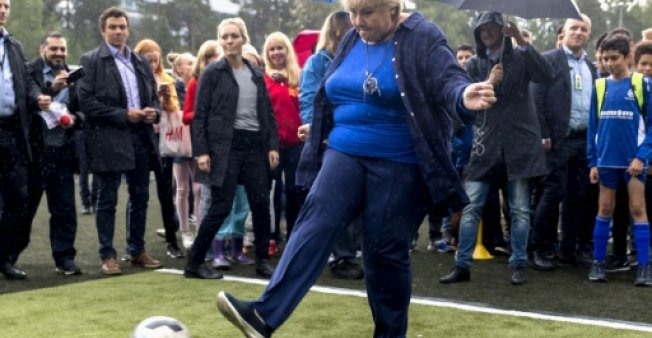 World
World

Norwegians cast their votes today in an election nail-biter that will decide whether "the world's happiest country" will be run by the outgoing rightwing coalition or the leftwing opposition for the next four years.
 |
| Norwegian Prime Minister and Conservative leader Erna Solberg shows off her football skills at a campaign event in Oslo. — AFP/VNA Photo |
OSLO — Norwegians cast their votes today in an election nail-biter that will decide whether "the world’s happiest country" will be run by the outgoing rightwing coalition or the leftwing opposition for the next four years.
Opinion polls have predicted an extraordinarily close race between Prime Minister Erna Solberg’s team and the opposition led by Labour’s Jonas Gahr Store.
Several small parties could end up as kingmakers in the oil-rich Nordic state.
Everything is "set for the biggest election thriller in many decades," a political commentator for TV2 television said after a final opinion poll published on Saturday credited the right with the narrowest possible majority, albeit within the margin of error.
In power since 2013, the coalition government, comprising Solberg’s Conservatives and the mildly populist anti-immigration Progress Party, has campaigned on a vow of continuity.
The government has successfully steered the wealthy country of 5.3 million -- Western Europe’s biggest oil producer -- through two crises: the oil industry’s slump after the drop in crude prices since 2014, and the migrant crisis in 2015.
"We want four more years to continue doing what works," the popular and experienced 56-year-old Solberg said.
Over the past four years, the right has focused on kickstarting the economy and preparing the country for the post-oil era by reducing taxes.
The opposition and many economists have however criticised the government for dipping too generously into the country’s massive sovereign wealth fund, worth almost US$1 trillion.
Meanwhile, Store, a millionaire, has vowed to raise taxes for the richest, in a bid to bolster Norwegians’ cherished welfare state and reduce inequalities in society.
"We need a change now because we are growing apart from each other," the 57-year-old Labour leader said Sunday after casting his ballot – with "butterflies in his stomach" -- with his wife in a school in a predominantly Conservative neighbourhood west of Oslo where they live.
Protest vote
In the main cities, polling stations opened on Sunday, the eve of the official voting day. Many voters -- more than one million of the 3.76 million registered -- also cast their ballots early in advance voting.
The Conservatives and Labour agree on many issues: continuing oil activities in the Arctic, a restricted immigration policy, and close ties with the EU, of which Norway is not a member.
Yet Labour has criticised Solberg for her difficulty in taming her occasionally provocative junior coalition partner, the Progress Party, especially Immigration and Integration Minister Sylvi Listhaug.
Both Labour and the Conservatives are expected to post lower election scores compared to four years ago.
As a result, both parties will be dependent on the support of smaller parties -- and tricky negotiations to form a government seem inevitable.
Small, anti-establishment parties are expected to play a bigger-than-usual role in the election.
Among them: the agrarian Centre Party opposed to the urban elite, the Green Party which wants to see the end of all new oil exploration, and the Red Party, which is Marxist.
Norway is blessed with high living standards, education and a comprehensive welfare state -- qualities that helped it to be named the happiest country in the world in a respected UN study in March.
Per Henrik, a voter in his 50s near Oslo’s city hall, said he was voting for the right for the sake of "stability."
"Some of the other parties I can’t see really forming a stable government," he said.
Another voter, Tore Utheim, said he wanted a change "for more equality in our society and a more human attitude towards refugees." — AFP




